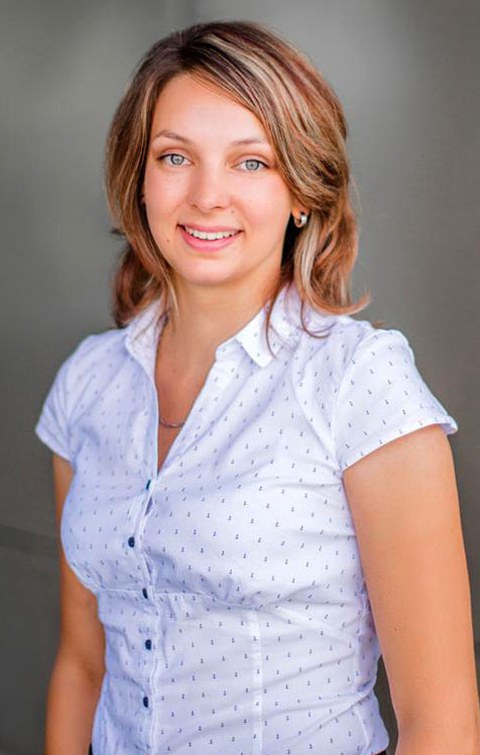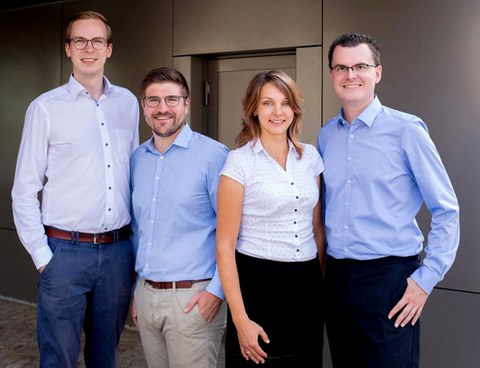A first-rate second choice
(Interview from 2022)
Dagmar Möbius
Anna Menschner would have liked to be a veterinarian. At Girls’ Day in 10th grade, she discovered her fascination for electrical engineering, and went on to study this at university. Although the subject was not her first choice, the 35-year-old engineer is now content with her career, which enabled her to become an entrepreneur three years ago.

Anna Menschner would like to encourage others to take the leap and found their own companies.
“You have to take things as they come,” says Anna Menschner, thinking back to when she began her studies. Her dream was to study veterinary medicine, but it remained just a dream. The alternative? Her interests were varied. She considered Political Science and Economics as options. But thinking back on the Girls’ Day she visited at TUD as a 10th-grader, the now 35-year-old decided to begin her studies in Electrical Engineering in 2007.
The issue of the gender quota
Anna Menschner only remembers good things about her studies. She never gave too much thought to equal opportunity employment schemes. For her, the issue is irrelevant. “There were some women in our class,” she says. “All genders were represented.” Period. The subject may have been her second choice, but she wanted to study at TU Dresden because she was from nearby and didn’t have to look for an apartment in another city. Plus, she wasn’t bound to the standard period of study and so didn’t have to worry about losing funding for her studies. “So there were plenty of practical reasons to study here,” she sums up.
A predilection for conceptual thinking
University was no walk in the park for her. “But I was good at math,” she says. “I didn’t have to think too much about it.” She was quick to understand and could process and prioritize knowledge systematically – a skill that remains very useful to her today. However, the specialist knowledge was more difficult to master. She was inspired by automation technician Dr. Annerose Braune as well as the practical lectures held by Prof. Leon Urbas from the Chair of Process Control Systems. “Mictroelectornics wasn’t really my thing,” says Anna Menschner. On the other hand, she’s great at conceptual design and has a strong technical grasp. She spent half a year in Västerås, Sweden, working on an automation concept for the mining industry.

The founding team of SEMODIA from left to right: Henry Bloch, Jan Funke, Anna Menschner, Stephan Hensel
Recognizing problems in the process manufacturing industry
After completing her studies in 2014, she accepted a position as a Research Associate at TUD’s Chair of Process Control Systems and in the Process Systems Engineering Group. The research topic she explored in her Diplom thesis was the cornerstone for translating the technology to the industrial sector. Using funding from dresden∣exists, Anna Menschner co-founded the company SEMODIA in May 2019 with three colleagues. As a managing director, she is responsible for product development, marketing and sales. What does a typical work day look like? “PowerPoint presentations and video conferences.” The name Semodia stands for “SEmantic MODelling In Automation.” And the name of the company is the name of the game – Anna Menschner and her team have identified the problems in the process manufacturing industry and they are working to solve them.
What SEMODIA does
Industry plants are very rigid, but they must constantly be reconfigured, for instance in the pharmaceutical industry. But differing automation technologies typically don’t work together. So the SEMODIA team has developed a type of modular assembly kit. A piece of software that works like a plug-and-play printer describes each module. It’s used primarily in the fine chemicals and pharmaceutical as well as food and beverage industries. But shipping and the hydrogen industry also benefit from the high-tech application. The company serves all of Europe as well as Singapore. “During the Covid-19 pandemic, all the trade fairs were canceled. That’s tough for a product that really requires personal explanation,” says Menschner. The team used the time to expand its product portfolio. “Of course, we aren’t looking to report unrealistic figures,” she says.

The latest SEMODIA product: a marketplace platform for the modular market of the process manufacturing industry
Seizing the opportunity
It wasn’t clear from the start that Anna Menschner would found a company. “We just seized an opportunity,” she says, and is thankful to have received so much support. The best part of it all is how easy it is to balance work and family. “This was particularly apparent during the hardest phases of the pandemic,” she says. She also appreciates the responsibility and the leeway she has for creativity and action. Now, she would like to impart others the courage to found their own companies. And she hopes that her company will exist for another 30 years. She still has connections to her alma mater today – one shareholder is a TUD professor and SEMODIA has already hired several students and alumni of TUD.
Looking back, Anna Menschner is very pleased with her choice of degree program. “If I hadn’t made that choice back then, I wouldn’t be where I am today.” Plus, she wouldn’t have met her husband and many other important figures in her life. “Everything happened just as it should have.”
Contact:
Anna Menschner
Managing Director & Co-Founder
SEMODIA GmbH
Meißner Straße 37
01445 Radebeul
Tel: +49 351 27 18 68 72
mobile: +49 151 55801319
Email
